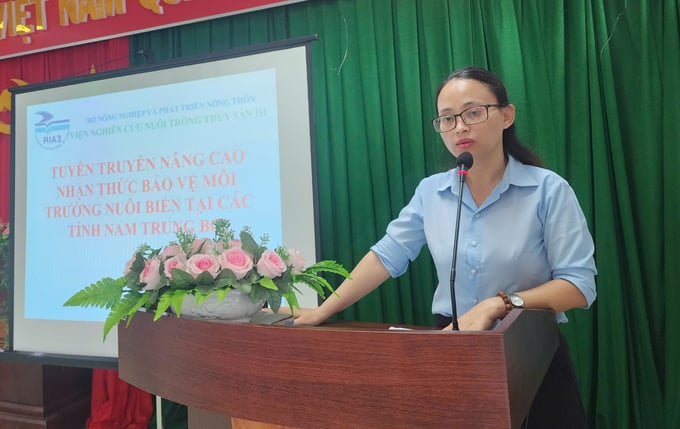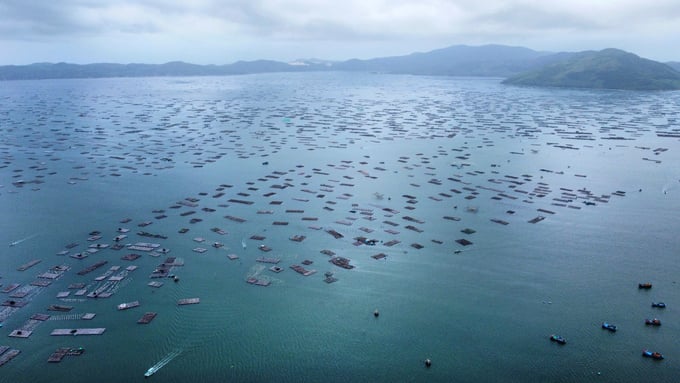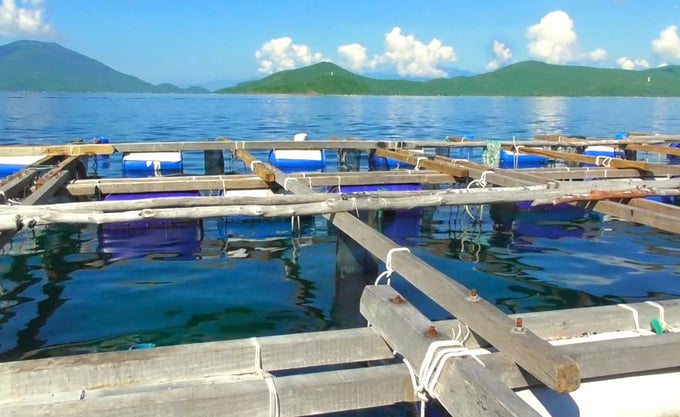May 21, 2025 | 08:22 GMT +7
May 21, 2025 | 08:22 GMT +7
Hotline: 0913.378.918
May 21, 2025 | 08:22 GMT +7
Hotline: 0913.378.918

Institute III organized a training course for local residents in Song Cau town (Phu Yen). Photo: PC.
In recent times, the Research Institute of Aquaculture III (the Institute) has been actively organizing a series of training courses and awareness-raising activities to improve the local population's understanding of environmental protection in aquaculture practices across the Central South region. This initiative is part of a broader effort under the responsibilities assigned to the Institute by the Ministry of Agriculture and Rural Development (MARD). The core focus of these training programs is on imparting technical knowledge, which helps to reduce the discharge of waste and byproducts from aquaculture activities into the marine environment.
To implement this, the Institute has worked closely with local authorities to conduct training directly in villages and communes with a significant number of aquaculture households. These training sessions aim not only to raise awareness but also to empower the local communities to actively engage in sustainable aquaculture practices.
Recently, the Institute has worked in collaboration with the Economic Department of Song Cau Town (Phu Yen Province) and the People's Committee of Xuan Phuong Commune (Song Cau Town) to organize a training session for local aquaculture farmers in Trung Trinh Village, Xuan Phuong Commune. The event saw a strong turnout, with a large number of local residents participating.
The atmosphere at the training was dynamic and engaging, highlighted by active discussions between the Institute's experts and the local community. The content of the discussions covered various important aspects of lobster cage farming, including the techniques involved in raising lobsters in cages, the processes of feeding and nutrition and the technical and management aspects of cage culture, such as food preparation, feeding strategies and general maintenance and care of the lobster farms. A key topic addressed was the importance of community involvement in collective efforts aimed at reducing environmental pollution in the aquaculture zones.
The experts also emphasized the need for improving environmental hygiene around aquaculture areas as a way to minimize the risk of disease outbreaks among the farmed species. By doing so, farmers can maintain healthier stock and achieve better productivity.

Mrs. Nguyen Vu Phuong Mai, Deputy Head of the Economic Department of Song Cau Town (Phu Yen), gave a speech at the training session. Photo: PC.
During the training session, Mr. Le Thanh Tam, from Trung Trinh Village, Xuan Phuong Commune, shared that he is currently managing 350 lobster cages in Xuan Dai Bay. He has consistently maintained a clean environment at his farming site, ensuring that nylon packaging used for feed and other household waste are collected and brought ashore for proper disposal. He also feeds his lobsters with an appropriate and balanced amount of food, which has contributed to the health and growth of the lobsters. Thanks to these practices, his lobsters are less susceptible to diseases, thrive well and produce high yields.
Mr. Tam emphasized that "I and the nearby lobster farms regularly remind each other to keep the aquaculture area clean. We work together to collect waste and concentrate it in a designated spot, which makes it easier to transport and dispose of it properly onshore".
Additionally, Mr. Le Ngoc Quang, also from Trung Trinh Village, who has previously farmed lobsters and is now working for several local lobster farms, spoke about the community's commitment to environmental protection. He noted that most aquaculture households in the area take waste management seriously, collecting it every day and bringing it ashore for disposal. However, he raised a concern about some of the younger workers at the farms, whose awareness of environmental issues is still lacking, which sometimes leads to the improper disposal of waste into the sea.
Given this situation, Mr. Quang expressed his hope that the Institute would continue to organize more training courses to improve the environmental awareness of both farmers and workers. He also suggested that the Institute collaborate more closely with local authorities to raise public awareness and encourage everyone to take more responsibility in keeping the aquaculture zones clean.

Song Cau Town (Phu Yen) currently has more than 129.000 lobster cages. Photo: PC.
According to the Economic Department of Song Cau Town, Phu Yen, the local area currently hosts more than 134.000 aquaculture cages for lobsters and marine fish. Of these, approximately 129.000 are dedicated to lobster farming, with around 4.000 households involved in this activity.
Mrs. Nguyen Vu Phuong Mai, the Deputy Head of the Economic Department of Song Cau Town, emphasized that environmental protection in aquaculture zones is a top priority for the local authorities. To address this, the town has introduced a waste collection model that is actively implemented in the area.
In addition to waste management, the local authorities are also focusing on educating aquaculture farmers about proper farming practices, especially regarding the density of cages. Each year, at the beginning of the farming season, the local government provides clear instructions on sustainable aquaculture practices. These guidelines include recommendations on the appropriate species to farm, the correct cage density, and the optimal farming seasons, all of which are based on the regulations set by the Department of Agriculture and Rural Development.
"The local government’s efforts to raise awareness about environmental protection have been successful. As a result, local residents have shown a significant improvement in their commitment to preserving the environment in aquaculture areas. Many households now actively participate in cleaning up their farming sites by collecting household waste, food packaging, and the remains of dead aquatic animals. These materials are then brought ashore and gathered at designated collection points for disposal by the local sanitation team", Mrs. Mai highlighted.

The environment in the aquaculture areas has gradually improved. Photo: PC.
According to Mrs. Mai, environmental monitoring in aquaculture zones is receiving increasing attention from various departments and organizations. The Research Institute of Aquaculture III, the Fisheries Sub-Department, and the Department of Natural Resources and Environment regularly announce monitoring results to the local authorities. These results are then shared with the community through the local government’s website.
In addition, the People's Committees of communes and wards also use loudspeakers to broadcast the monitoring results directly to the aquaculture farmers so that they can stay informed in a timely manner. Furthermore, the Fisheries Sub-Department sends environmental monitoring updates to the farmers via text messages to ensure that everyone is kept up to date on the environmental conditions in their farming areas.
Prof. Dr. Vo Van Nha, Director of the Research Institute of Aquaculture III, shared that in the future, the institute will continue to conduct frequent awareness campaigns and training courses to further improve the environmental consciousness of local aquaculture farmers.
“We also hope that the local community will become more aware of the need to take responsibility for managing the waste generated by their aquaculture activities. This will help stabilize the environment in the farming areas, reduce the impact on the aquaculture stock, and ensure that waste collection is carried out regularly”, said Dr. Nha.
Translated by Phuong Linh

(VAN) In 2024, over 295 million people across 53 countries and territories faced acute hunger—an increase of almost 14 million people compared to 2023, while the number of people facing catastrophic levels of hunger reached a record high.

(VAN) World Environment Day 2025 (June 5) carries the theme 'Beat Plastic Pollution' continuing to emphasize the global urgency of addressing the plastic waste crisis.

(VAN) This was the assessment shared by experts at the workshop titled 'Assessing the Role and Potential of Low-Emission Rice Production Systems in Vietnam,' held on the morning of May 19.

(VAN) Cai Rong Port is the fisheries control center of Quang Ninh, helping to monitor fishing vessels, combat IUU fishing, and remove the EC's 'yellow card'.

(VAN) The German Agricultural Society (DLG) explores the possibility of establishing a mechanization service center in Vietnam’s Mekong Delta to support farmers in accessing and utilizing advanced machinery.

(VAN) On May 16, the Department of Water Resources Management, in collaboration with the Food and Agriculture Organization of the United Nations (FAO), held a signing ceremony for the GEF-8 project document.

(VAN) Food safety, mechanization, vocational training, and market opening are key areas of cooperation expected between the Vietnamese Government and the Federal Republic of Germany.